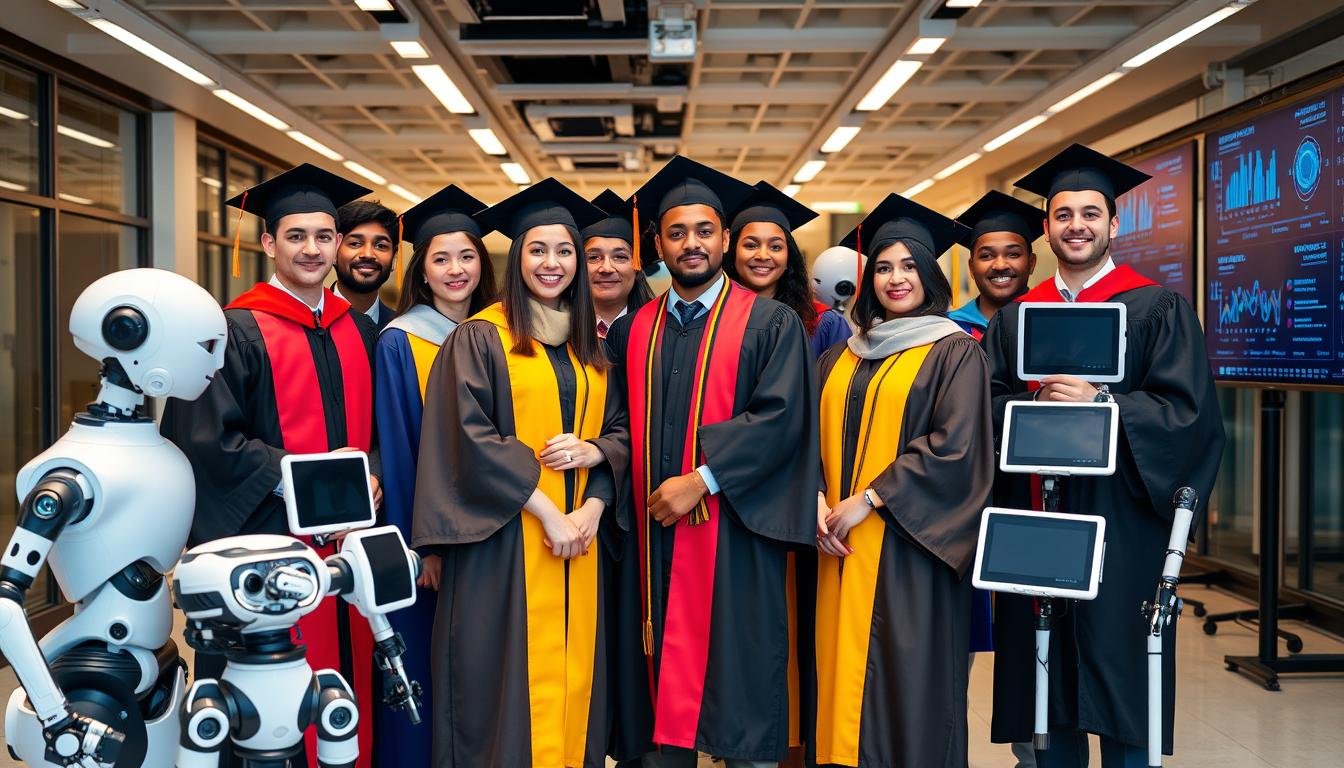In today’s rapidly evolving job market, the rise of automation has become a pressing concern for many individuals, including those with advanced degrees like a master’s. The question remains: how will the increased use of robots and artificial intelligence impact employment opportunities for master’s graduates? Understanding the nuances of this complex issue is crucial in navigating the changing landscape of the workforce.
Key Takeaways
- Automation, particularly the use of robots, has had a measurable impact on employment and wages in the United States.
- Industries such as automotive, electronics, and plastics and chemicals have adopted robots more extensively, leading to job losses in those sectors.
- The impact of automation is more significant for workers in routine manual occupations, lower and middle-class individuals, and those without college degrees.
- Master’s graduates may need to focus on developing specialized knowledge, leadership skills, and emotional intelligence to remain competitive in the job market.
- Governments and employers must collaborate to implement policies and initiatives that support lifelong learning and reskilling to help workers adapt to the changing job landscape.
Introduction to Automation and Its Impact on Employment
The late 1990s marked the beginning of an era defined by the widespread adoption of automation and digitization. This shift from mechanical and analog electronic technologies to digital electronics has had a significant impact on the workplace and the economy. As we continue to witness the rise of artificial intelligence (AI) and advancements in robotics, the concerns surrounding the potential displacement of workers by technology have intensified.
While the initial impact of automation has been predominantly observed in “blue-collar” jobs, there is a growing fear that high-skilled, “white-collar” positions may also be affected by the rapid technological advancements. This transformation has the potential to significantly impact the graduate labor market, as AI and robotics systems become more sophisticated and integrated into various industries.
Historical Overview of Automation
The historical overview of automation reveals the gradual but persistent integration of automated systems into the workforce. From the early days of mechanization in the manufacturing industry to the more recent advancements in computer-controlled processes, the impact of automation on employment has been a subject of ongoing discussion and research.
The Rise of Artificial Intelligence and Robotics
The rise of artificial intelligence and robotics has accelerated the pace of digital transformation, with smart and autonomous systems powered by data and AI technologies, such as machine learning and deep learning, becoming increasingly prevalent in the workplace. As these systems grow more sophisticated, the concerns about their potential impact on jobs, particularly among graduate-level professionals, have escalated.
Fears and Predictions Surrounding Job Losses Due to Automation
The prospect of widespread job losses due to automation has sparked significant fears and predictions. One influential 2013 study suggested that up to 47% of U.S. workers could see their jobs become automated within a decade or two. This has led to growing concerns over the potential economic impact of automation and AI replacing human labor.
However, the views among economists are divided on the extent of the job displacement. While 48% believe that robots and digital agents will displace significant numbers of both blue-collar and white-collar workers, 52% expect that technology will actually create more jobs than it displaces. This disparity in predictions reflects the ongoing debate over the long-term effects of automation on the job loss predictions, automation fears, and overall economic impact.

As the adoption of advanced technologies, such as robotics and artificial intelligence, continues to accelerate, the uncertainty surrounding the future of work has become a pressing concern for policymakers, employers, and workers alike. The potential disruption to traditional job roles and the need for workers to adapt their skills have fueled a growing dialogue on the societal implications of this technological revolution.
Evidence on the Impact of Robots on Employment and Wages
Recent research by renowned economists Daron Acemoglu of MIT and Pascual Restrepo of Boston University has shed light on the real-world impact of industrial robots on employment and wages. Their findings paint a nuanced picture of how automation is reshaping the job market.
Acemoglu and Restrepo’s Groundbreaking Study
Acemoglu and Restrepo’s study revealed that the deployment of industrial robots has a tangible negative impact on workers. For every additional robot per 1,000 employees in the U.S., wages declined by 0.42% and the employment-to-population ratio dropped by 0.2 percentage points, leading to the loss of around 400,000 jobs.
Industries Most Affected by Robotization
The researchers found that the automotive industry has been the most aggressive adopter of robotics, employing 38% of all existing industrial robots and deploying up to 7.5 robots per thousand workers. The electronics and plastics/chemicals industries also rely heavily on automation, employing 15% and 10% of robots respectively. Employees in these sectors have experienced the most significant negative effects from the rise of robotics.
Beyond manufacturing, the study also estimated negative impacts for workers in construction, retail, and personal services, as robots and AI continue to disrupt traditional job functions across the economy.
The Displacement Effect vs. Productivity Effects of Automation
As technology continues to advance, the impact of automation on the job market is a topic of growing concern. On one hand, the displacement effect of automation can adversely affect wages and employment, as robots and other automated systems take on tasks previously done by human workers. However, the productivity effects of automation can also have a positive impact, making certain tasks easier to complete and creating new jobs and roles for workers.
Balancing Job Losses and Productivity Gains
Researchers Acemoglu and Restrepo have found that while automation technologies always create both displacement and productivity effects, robots in particular tend to have a stronger displacement effect. This underscores the need for a more holistic understanding of the impacts of automation, as it does not inherently lead to shared prosperity. Instead, the benefits of automation must be carefully balanced with strategies to create new jobs and roles for workers.
By understanding the nuances of the displacement effect and productivity effects of automation, policymakers and employers can work to mitigate job losses while also harnessing the efficiency gains of technological advancements. This delicate balance is crucial in ensuring that the workforce is equipped to thrive in the age of automation.

Skills Needed to Work Alongside Automation
As automation and artificial intelligence (AI) continue to transform the job market, it’s essential for workers to develop the skills needed to work alongside these technologies effectively. Recent research indicates that workers with strong digital skills are well-equipped to adapt to the changing workplace.
Digital and Technical Skills
Proficiency in programming, data management, and machine learning are becoming increasingly valuable in today’s job market. Employers are seeking individuals who can harness the power of technology to drive innovation and productivity. By developing these digital and technical skills, you can position yourself as a valuable asset in industries that are embracing automation.
Soft Skills and Emotional Intelligence
While technical skills are crucial, employers are also seeking candidates with strong soft skills and emotional intelligence. As automation takes over routine tasks, the demand for skills like critical thinking, problem-solving, and effective communication is on the rise. By cultivating these soft skills, you can demonstrate your ability to adapt to the changing nature of work and collaborate with AI and automation seamlessly.
Whether you come from a technical or non-technical background, developing a well-rounded skill set that combines digital, technical, and soft skills can help you thrive in the age of automation. By embracing these skills, you can position yourself to work alongside AI and automation, leveraging their capabilities to enhance your own productivity and career growth.
standing out in competitive job markets with a master’s
In today’s rapidly evolving job market, a master’s degree can be a powerful asset for career advancement. The Continents States University’s unique approach empowers students to gain specialized knowledge, develop leadership skills, and enhance their personal branding – all while benefiting from global networking opportunities and personalized support.
Through the university’s innovative membership-based tuition model, you can access affordable online degree programs with flexible learning schedules and a competency-based education approach. This allows you to tailor your studies to your specific career goals, giving you a competitive edge in the job market affected by automation.
By earning a master’s degree from The Continents States University, you’ll not only strengthen your resume but also expand your industry expertise. The university’s digital learning platform and scholarship opportunities further empower you to leverage your advanced skills and knowledge for career success, standing out in the increasingly competitive job landscape.
Emerging and Declining Job Roles in the Age of Automation
The rapid advancements in automation, driven by technologies like artificial intelligence and robotics, are significantly reshaping the job market. The World Economic Forum’s Future of Jobs Report 2020 sheds light on the emerging and declining job roles in this transformative era.
The report highlights several job roles that are expected to see increasing demand, such as Data Analysts and Scientists, AI and Machine Learning Specialists, and Big Data Specialists. These emerging job roles reflect the growing need for professionals who can harness the power of data and advanced technologies to drive innovation and business growth.
Conversely, the report identifies job roles like Data Entry Clerks, Accounting and Bookkeeping Clerks, and Administrative and Executive Secretaries as those that are expected to see decreasing demand. This shift underscores the impact of automation on traditional job functions that can be readily automated, emphasizing the need for graduates to develop a mix of digital, technical, and soft skills to adapt to the changing job market.
As the automation impact continues to reshape the employment landscape, it is crucial for graduates to stay ahead of the curve and acquire the necessary competencies to thrive in the emerging job roles of the future. By embracing lifelong learning and continuously upskilling, individuals can position themselves for success in the dynamic, technology-driven job market.
The Role of Governments and Employers in Upskilling and Reskilling
As the world of work rapidly transforms due to automation and emerging technologies, the role of governments and employers in supporting upskilling and reskilling initiatives becomes increasingly crucial. Research suggests that many employers have not been proactive in their efforts to upskill or retrain employees, often citing the high cost as a deterrent. This is where governments can step in and increase the availability of training opportunities to help workers adapt to the changing job market.
Initiatives and Policies for Lifelong Learning
Projects such as the OECD’s Work, Innovation, Productivity and Skills (WIPS) initiative are building the evidence base for policymakers to act on, identifying policies that can maximize the benefits while addressing the risks and challenges associated with automation and artificial intelligence. The UK Government, for example, has been proactive in this regard, releasing their Skills for Jobs White Paper to reform further education and support people in gaining the skills the economy needs throughout their lives. These government-backed lifelong learning programs aim to empower workers to upskill and reskill as the job market evolves, ensuring they remain employable and can adapt to the government role and employer role in shaping the future of work.

Limitations of Automation: Tasks Machines Cannot Replicate
While automation and artificial intelligence (AI) have made significant strides, they still struggle to replicate certain uniquely human capabilities. One key limitation is the lack of social intelligence, the ability to empathize, persuade, and negotiate effectively. Machines may excel at data analysis and pattern recognition, but they often fall short when it comes to the nuanced interpersonal skills required for roles involving customer service, human resources, or leadership.
Creativity is another area where automation falls short. The creative process involves the generation of novel ideas, the ability to think outside the box, and the unique qualities of human thought that machines cannot yet replicate. Despite advancements in machine learning, the complex and intuitive nature of creativity remains a challenge for automation. Fostering an environment that supports creative learning and development is often the focus of science-backed recommendations, and it is still decades away from being possible to teach a machine this human talent.
The limitations of automation highlight the ongoing importance of skills such as social intelligence and creativity. Jobs that require these uniquely human capabilities are less susceptible to being replaced by machines, making them valuable assets in the job market. As the world of work continues to evolve, a focus on developing and honing these skills can help individuals and organizations stay ahead of the curve.
Preparing for the Future of Work
As the job market continues to evolve due to the rapid advancements in automation and artificial intelligence, it is crucial for master’s graduates to proactively develop the necessary skills to thrive in this changing landscape. Adapting to automation requires not only enhancing your digital and technical capabilities but also cultivating essential soft skills like emotional intelligence, critical thinking, and creativity.
Strategies for Adapting to Automation
By leveraging your master’s degree from an institution like The Continents States University, you can gain the specialized knowledge, personal branding, and adaptability required to succeed in the age of automation. Focus on continuously improving your digital prowess, mastering data analytics, and staying current with emerging technologies. At the same time, invest in developing your interpersonal skills, problem-solving abilities, and innovative thinking.
Preparing for the future of work also involves diversifying your skillset and exploring opportunities in industries and roles that complement automation, rather than being directly replaced by it. Strategies for success include embracing lifelong learning, collaborating with technology, and demonstrating your unique value proposition to potential employers.

By taking a proactive approach and adapting to the changing job market, master’s graduates can position themselves for long-term career success, even as automation continues to transform the way we work.
Conclusion
While the impact of automation on employment and wages is a growing concern, a master’s degree can provide the competitive edge needed to stand out in the job market. By developing a diverse skillset, including digital, technical, and soft skills, you can position yourself to work alongside automation and capitalize on emerging job opportunities. With the support of forward-thinking institutions like The Continents States University, master’s graduates can navigate the changing workforce landscape and achieve long-term career success.
The key takeaways from this article are clear: in the age of automation, a master’s degree can be the key to unlocking your path to career success. By embracing the evolving landscape of work and continuously upskilling, you can adapt to the demands of the future and thrive in the automation age. With the right strategies and a commitment to lifelong learning, your master’s degree can be the catalyst for a rewarding and fulfilling career journey.
As you embark on your career, remember that your ability to work alongside automation, combined with your diverse skillset and adaptability, will be your greatest assets. By staying informed, proactive, and open to new opportunities, you can position yourself for long-term success in the ever-changing world of work. The future may be uncertain, but with a master’s degree from a reputable institution, you’ll be well-equipped to navigate it with confidence and achieve your professional goals.
Source Links
- The future of work: impact of automation on graduate jobs – https://luminate.prospects.ac.uk/the-impact-of-automation-on-graduate-jobs
- A new study measures the actual impact of robots on jobs. It’s significant. | MIT Sloan – https://mitsloan.mit.edu/ideas-made-to-matter/a-new-study-measures-actual-impact-robots-jobs-its-significant
- The Impact of Automation on Employment – https://www.mycvcreator.com/blog/the-impact-of-automation-on-employment


